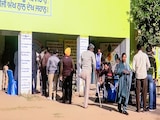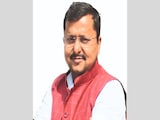- Second phase of voter roll revision to cover 12 states and union territories, starting after Bihar polls
- Enumeration stage will run from November 4 to December 4 and draft rolls will be released December 9
- The final list will be published on February 7, before the elections in Tamil Nadu, Bengal, and Kerala
The second phase of voter roll revisions will be held in 12 states and union territories - including Bengal and Tamil Nadu, both of whom will vote in high-profile elections next year and Uttar Pradesh, which will vote in 2027 - and will start after next month's Bihar poll, the Election Commission said Monday.
Voter lists in Andaman and Nicobar, Chhattisgarh, Goa, Gujarat, Kerala, Lakshadweep, Madhya Pradesh, Puducherry, and Rajasthan will also be revised in this phase. Of these, Goa, Gujarat, and Puducherry will also be voting next year. But Assam, which also votes next year, has been overlooked.
Asked about this, the poll panel said that since citizenship rules for Assam 'differ from the rest of the country', voter list revision for the northeastern state will be held at a later date.
In each of the above 12 states, the enumeration stage will be from November 4 to December 4.
Draft rolls will be released December 9, the EC said. Voters struck from the rolls can file appeals from date of publication of draft rolls to January 8. The final revised voter list will be published February 7.
The first phase of this nationwide 'special intensive revision' of voter lists was conducted over June and July in Bihar, an exercise the poll body said was completed with the publication of the final roll on September 30. There were "zero appeals" against 'wrongful deletions', the EC said.
Sources told NDTV last week the process - four months in Bihar - will now be shortened.
Data on electors and polling booths in 12 states set for SIR in phase 2. Credit: ECI
"As per law, electoral rolls have to be revised before every election or as per requirement," Chief Election Commissioner Gyanesh Kumar said in a press conference, pointing out the opposition, which had questioned the timing of the Bihar voter list revision, coming as it did less than six months before the election, had also "been raising issues relating to the quality of voter rolls".
"SIR (i.e., special intensive revision of voter lists) have already been done eight times from 1951 till 2004. The last SIR was done more than 21 years ago...from 2002 to 2004," Kumar said.
Timeline for second phase of nationwide SIR. Credit: ECI
"Many changes in electoral rolls have occurred (since) due to frequent migration, which may have resulted in voters getting registered in more than one place," he explained.
Other reasons why a voter list refresh may be needed are to remove the names of those who have died or those whose names may have been wrongfully included, such as foreigners.
Back in September the EC had said it will conduct a national SIR in the entire country "for the discharge of its constitutional mandate to protect the integrity of electoral rolls".
The first step in that was the revision of voter lists in Bihar.
That, though, was not without problems, with the Supreme Court having to direct the poll body to include Aadhaar in the list of 'indicative documents', any of which can be submitted as proof of identity to seek inclusion or exclusion from the voter rolls. The court over-ruled the EC's reservations about forgery, and called for 'en masse exclusion' instead of 'en masse inclusion'.
Ultimately, nearly 65 lakh voters - from a total of 7.24 crore - were excluded.
The opposition claimed the Bihar SIR was aimed at mass disenfranchisement, particularly of poor and minority communities who might support them, in the build-up to this election.
Congress MP Rahul Gandhi led that charge, producing data from Karnataka and Maharashtra to claim collusion between the EC and the BJP to deliver massive wins for the ruling party.
Both the EC and the BJP firmly rubbished such claims and demanded the opposition furnish proof of its allegations in court.















